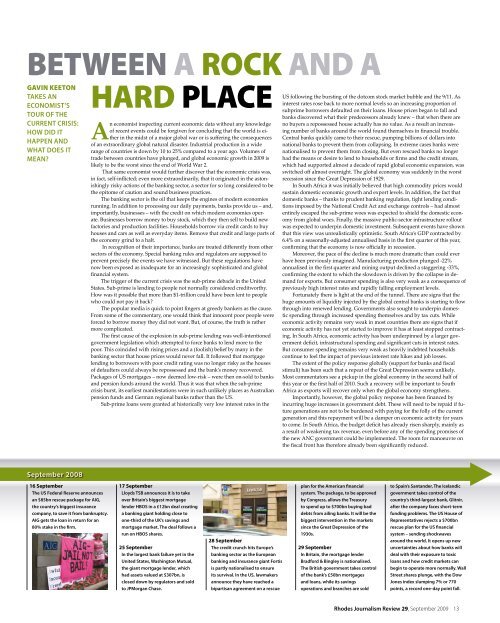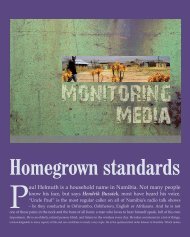Riding on the cup: - Rhodes Journalism Review - Rhodes University
Riding on the cup: - Rhodes Journalism Review - Rhodes University
Riding on the cup: - Rhodes Journalism Review - Rhodes University
Create successful ePaper yourself
Turn your PDF publications into a flip-book with our unique Google optimized e-Paper software.
eTWeen a rock and a<br />
hard place<br />
Gavin keeT<strong>on</strong><br />
TAkES AN<br />
ECONOmIST’S<br />
TOUR OF THE<br />
CURRENT CRISIS:<br />
HOW DID IT<br />
HAPPEN AND<br />
WHAT DOES IT<br />
mEAN?<br />
September 2008<br />
16 september<br />
The US Federal Reserve announces<br />
an $85bn rescue package for AIg,<br />
<strong>the</strong> country’s biggest insurance<br />
company, to save it from bankruptcy.<br />
AIg gets <strong>the</strong> loan in return for an<br />
80% stake in <strong>the</strong> firm.<br />
An ec<strong>on</strong>omist inspecting current ec<strong>on</strong>omic data without any knowledge<br />
of recent events could be forgiven for c<strong>on</strong>cluding that <strong>the</strong> world is ei<strong>the</strong>r<br />
in <strong>the</strong> midst of a major global war or is suffering <strong>the</strong> c<strong>on</strong>sequences<br />
of an extraordinary global natural disaster. Industrial producti<strong>on</strong> in a wide<br />
range of countries is down by 10 to 25% compared to a year ago. Volumes of<br />
trade between countries have plunged, and global ec<strong>on</strong>omic growth in 2009 is<br />
likely to be <strong>the</strong> worst since <strong>the</strong> end of World War 2.<br />
That same ec<strong>on</strong>omist would fur<strong>the</strong>r discover that <strong>the</strong> ec<strong>on</strong>omic crisis was,<br />
in fact, self-inflicted; even more extraordinarily, that it originated in <strong>the</strong> ast<strong>on</strong>ishingly<br />
risky acti<strong>on</strong>s of <strong>the</strong> banking sector, a sector for so l<strong>on</strong>g c<strong>on</strong>sidered to be<br />
<strong>the</strong> epitome of cauti<strong>on</strong> and sound business practices.<br />
The banking sector is <strong>the</strong> oil that keeps <strong>the</strong> engines of modern ec<strong>on</strong>omies<br />
running. In additi<strong>on</strong> to processing our daily payments, banks provide us – and,<br />
importantly, businesses – with <strong>the</strong> credit <strong>on</strong> which modern ec<strong>on</strong>omies operate.<br />
Businesses borrow m<strong>on</strong>ey to buy stock, which <strong>the</strong>y <strong>the</strong>n sell to build new<br />
factories and producti<strong>on</strong> facilities. Households borrow via credit cards to buy<br />
houses and cars as well as everyday items. Remove that credit and large parts of<br />
<strong>the</strong> ec<strong>on</strong>omy grind to a halt.<br />
In recogniti<strong>on</strong> of <strong>the</strong>ir importance, banks are treated differently from o<strong>the</strong>r<br />
sectors of <strong>the</strong> ec<strong>on</strong>omy. Special banking rules and regulators are supposed to<br />
prevent precisely <strong>the</strong> events we have witnessed. But <strong>the</strong>se regulati<strong>on</strong>s have<br />
now been exposed as inadequate for an increasingly sophisticated and global<br />
financial system.<br />
The trigger of <strong>the</strong> current crisis was <strong>the</strong> sub-prime debacle in <strong>the</strong> United<br />
States. Sub-prime is lending to people not normally c<strong>on</strong>sidered creditworthy.<br />
How was it possible that more than $1-trilli<strong>on</strong> could have been lent to people<br />
who could not pay it back?<br />
The popular media is quick to point fingers at greedy bankers as <strong>the</strong> cause.<br />
From some of <strong>the</strong> commentary, <strong>on</strong>e would think that innocent poor people were<br />
forced to borrow m<strong>on</strong>ey <strong>the</strong>y did not want. But, of course, <strong>the</strong> truth is ra<strong>the</strong>r<br />
more complicated.<br />
The first cause of <strong>the</strong> explosi<strong>on</strong> in sub-prime lending was well-intenti<strong>on</strong>ed<br />
government legislati<strong>on</strong> which attempted to force banks to lend more to <strong>the</strong><br />
poor. This coincided with rising prices and a (foolish) belief by many in <strong>the</strong><br />
banking sector that house prices would never fall. It followed that mortgage<br />
lending to borrowers with poor credit rating was no l<strong>on</strong>ger risky as <strong>the</strong> houses<br />
of defaulters could always be repossessed and <strong>the</strong> bank’s m<strong>on</strong>ey recovered.<br />
Packages of US mortgages – now deemed low-risk – were <strong>the</strong>n <strong>on</strong>-sold to banks<br />
and pensi<strong>on</strong> funds around <strong>the</strong> world. Thus it was that when <strong>the</strong> sub-prime<br />
crisis burst, its earliest manifestati<strong>on</strong>s were in such unlikely places as Australian<br />
pensi<strong>on</strong> funds and German regi<strong>on</strong>al banks ra<strong>the</strong>r than <strong>the</strong> US.<br />
Sub-prime loans were granted at historically very low interest rates in <strong>the</strong><br />
17 september<br />
lloyds TSB announces it is to take<br />
over Britain’s biggest mortgage<br />
lender HBOS in a £12bn deal creating<br />
a banking giant holding close to<br />
<strong>on</strong>e-third of <strong>the</strong> Uk’s savings and<br />
mortgage market. The deal follows a<br />
run <strong>on</strong> HBOS shares.<br />
25 september<br />
In <strong>the</strong> largest bank failure yet in <strong>the</strong><br />
United States, Washingt<strong>on</strong> mutual,<br />
<strong>the</strong> giant mortgage lender, which<br />
had assets valued at $307bn, is<br />
closed down by regulators and sold<br />
to JPmorgan Chase.<br />
28 september<br />
The credit crunch hits Europe’s<br />
banking sector as <strong>the</strong> European<br />
banking and insurance giant Fortis<br />
is partly nati<strong>on</strong>alised to ensure<br />
its survival. In <strong>the</strong> US, lawmakers<br />
announce <strong>the</strong>y have reached a<br />
bipartisan agreement <strong>on</strong> a rescue<br />
US following <strong>the</strong> bursting of <strong>the</strong> dotcom stock market bubble and <strong>the</strong> 9/11. As<br />
interest rates rose back to more normal levels so an increasing proporti<strong>on</strong> of<br />
subprime borrowers defaulted <strong>on</strong> <strong>the</strong>ir loans. House prices began to fall and<br />
banks discovered what <strong>the</strong>ir predecessors already knew – that when <strong>the</strong>re are<br />
no buyers a repossessed house actually has no value. As a result an increasing<br />
number of banks around <strong>the</strong> world found <strong>the</strong>mselves in financial trouble.<br />
Central banks quickly came to <strong>the</strong>ir rescue, pumping billi<strong>on</strong>s of dollars into<br />
nati<strong>on</strong>al banks to prevent <strong>the</strong>m from collapsing. In extreme cases banks were<br />
nati<strong>on</strong>alised to prevent <strong>the</strong>m from closing. But even rescued banks no l<strong>on</strong>ger<br />
had <strong>the</strong> means or desire to lend to households or firms and <strong>the</strong> credit stream,<br />
which had supported almost a decade of rapid global ec<strong>on</strong>omic expansi<strong>on</strong>, was<br />
switched off almost overnight. The global ec<strong>on</strong>omy was suddenly in <strong>the</strong> worst<br />
recessi<strong>on</strong> since <strong>the</strong> Great Depressi<strong>on</strong> of 1929.<br />
In South Africa it was initially believed that high commodity prices would<br />
sustain domestic ec<strong>on</strong>omic growth and export levels. In additi<strong>on</strong>, <strong>the</strong> fact that<br />
domestic banks – thanks to prudent banking regulati<strong>on</strong>, tight lending c<strong>on</strong>diti<strong>on</strong>s<br />
imposed by <strong>the</strong> Nati<strong>on</strong>al Credit Act and exchange c<strong>on</strong>trols – had almost<br />
entirely escaped <strong>the</strong> sub-prime woes was expected to shield <strong>the</strong> domestic ec<strong>on</strong>omy<br />
from global woes. Finally, <strong>the</strong> massive public-sector infrastructure rollout<br />
was expected to underpin domestic investment. Subsequent events have shown<br />
that this view was unrealistically optimistic. South Africa’s GDP c<strong>on</strong>tracted by<br />
6.4% <strong>on</strong> a seas<strong>on</strong>ally-adjusted annualised basis in <strong>the</strong> first quarter of this year,<br />
c<strong>on</strong>firming that <strong>the</strong> ec<strong>on</strong>omy is now officially in recessi<strong>on</strong>.<br />
Moreover, <strong>the</strong> pace of <strong>the</strong> decline is much more dramatic than could ever<br />
have been previously imagined. Manufacturing producti<strong>on</strong> plunged -22%<br />
annualised in <strong>the</strong> first quarter and mining output declined a staggering -33%,<br />
c<strong>on</strong>firming <strong>the</strong> extent to which <strong>the</strong> slowdown is driven by <strong>the</strong> collapse in demand<br />
for exports. But c<strong>on</strong>sumer spending is also very weak as a c<strong>on</strong>sequence of<br />
previously high interest rates and rapidly falling employment levels.<br />
Fortunately <strong>the</strong>re is light at <strong>the</strong> end of <strong>the</strong> tunnel. There are signs that <strong>the</strong><br />
huge amounts of liquidity injected by <strong>the</strong> global central banks is starting to flow<br />
through into renewed lending. Governments also sought to underpin domestic<br />
spending through increased spending <strong>the</strong>mselves and by tax cuts. While<br />
ec<strong>on</strong>omic activity remains very weak in most countries <strong>the</strong>re are signs that if<br />
ec<strong>on</strong>omic activity has not yet started to improve it has at least stopped c<strong>on</strong>tracting.<br />
In South Africa, ec<strong>on</strong>omic activity has been underpinned by a larger government<br />
deficit, infrastructural spending and significant cuts in interest rates.<br />
But c<strong>on</strong>sumer spending remains very weak as heavily indebted households<br />
c<strong>on</strong>tinue to feel <strong>the</strong> impact of previous interest rate hikes and job losses.<br />
The extent of <strong>the</strong> policy resp<strong>on</strong>se globally (support for banks and fiscal<br />
stimuli) has been such that a repeat of <strong>the</strong> Great Depressi<strong>on</strong> seems unlikely.<br />
Most commentators see a pickup in <strong>the</strong> global ec<strong>on</strong>omy in <strong>the</strong> sec<strong>on</strong>d half of<br />
this year or <strong>the</strong> first half of 2010. Such a recovery will be important to South<br />
Africa as exports will recover <strong>on</strong>ly when <strong>the</strong> global ec<strong>on</strong>omy streng<strong>the</strong>ns.<br />
Importantly, however, <strong>the</strong> global policy resp<strong>on</strong>se has been financed by<br />
incurring huge increases in government debt. These will need to be repaid if future<br />
generati<strong>on</strong>s are not to be burdened with paying for <strong>the</strong> folly of <strong>the</strong> current<br />
generati<strong>on</strong> and this repayment will be a damper <strong>on</strong> ec<strong>on</strong>omic activity for years<br />
to come. In South Africa, <strong>the</strong> budget deficit has already risen sharply, mainly as<br />
a result of weakening tax revenue, even before any of <strong>the</strong> spending promises of<br />
<strong>the</strong> new ANC government could be implemented. The room for manoeuvre <strong>on</strong><br />
<strong>the</strong> fiscal fr<strong>on</strong>t has <strong>the</strong>refore already been significantly reduced.<br />
plan for <strong>the</strong> American financial<br />
system. The package, to be approved<br />
by C<strong>on</strong>gress, allows <strong>the</strong> Treasury<br />
to spend up to $700bn buying bad<br />
debts from ailing banks. It will be <strong>the</strong><br />
biggest interventi<strong>on</strong> in <strong>the</strong> markets<br />
since <strong>the</strong> great Depressi<strong>on</strong> of <strong>the</strong><br />
1930s.<br />
29 september<br />
In Britain, <strong>the</strong> mortgage lender<br />
Bradford & Bingley is nati<strong>on</strong>alised.<br />
The British government takes c<strong>on</strong>trol<br />
of <strong>the</strong> bank’s £50bn mortgages<br />
and loans, while its savings<br />
operati<strong>on</strong>s and branches are sold<br />
to Spain’s Santander. The Icelandic<br />
government takes c<strong>on</strong>trol of <strong>the</strong><br />
country’s third-largest bank, glitnir,<br />
after <strong>the</strong> company faces short-term<br />
funding problems. The US House of<br />
Representatives rejects a $700bn<br />
rescue plan for <strong>the</strong> US financial<br />
system – sending shockwaves<br />
around <strong>the</strong> world. It opens up new<br />
uncertainties about how banks will<br />
deal with <strong>the</strong>ir exposure to toxic<br />
loans and how credit markets can<br />
begin to operate more normally. Wall<br />
Street shares plunge, with <strong>the</strong> Dow<br />
J<strong>on</strong>es index slumping 7% or 770<br />
points, a record <strong>on</strong>e-day point fall.<br />
<strong>Rhodes</strong> <strong>Journalism</strong> <strong>Review</strong> 29, september 2009 13








